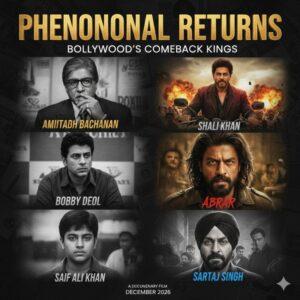Have you ever wondered what actually goes on behind-the-scenes when actors shoot intimate scenes? Well, we were just as curious as you.
And so we sat down with India’s first ever intimacy coordinator, Aastha Khanna and asked her how she runs things. From how many people are actually present on set to how ‘real’ is the sex, she really spilled the beans.

Obviously, we couldn’t hold back from asking how ‘real’ is the sex being had on-screen? And Aastha revealed that it is all simulated. It’s her job to make it look realistic, all while respecting the boundaries of the actors.
I discuss their consent, their boundaries, what are they not good with, what parts of their body are they okay to use, how much nudity are they okay to show. And then we get into rehearsal and workshop. That’s when I get there and simulate and choreograph the ways in which we can achieve the scene while upholding the actor’s consent.
-Aastha Khanna
Aastha added that she also has to keep in mind the creative vision of the director when she makes decisions about the choreography.
The director has a clear idea of what they’re looking for in a scene, how they’re looking at the choreography, what kind of mood they’re trying to create. What is the impact of the scene in the larger picture.
-Aastha Khanna
But don’t things get awkward? How many people are actually there on set when these scenes are shot? According to Aastha, a good closed set should have 3-4 people, apart from the actors but you can’t push that, so you usually end up having 7-8 people on set.
Sorry to burst your bubble everyone, but Aastha revealed that most of the sex has actually been rehearsed multiple times. Rehearsals obviously play a huge role when it comes to breaking the ice. However, not everything is pre-planned. According to Aastha, most of the time it depends on what the director wants, especially if they want to go with the flow.

I focus very vigorously on rehearsals so that the actors are clear of each other’s boundaries. That becomes an outline and then they know that their ‘going with the flow’ is within the realm of possibility, within their consent. There could be a scene where I would turn around and say “the first thing you need to do is touch this person’s face, then you touch their shoulder and then kiss their neck and then move to the back.”
-Aastha Khanna
But this is only done if both the actors are okay with the neck and the shoulder and the back being touched. And if one actor has a problem with the back of the neck or touching of hair, then Aastha makes their boundaries clear.
While the director might say this because they want it to look organic as opposed to rehearsed, the way we function is – when you know a person is not going to bite your neck when they’ve said they’re going to kiss the corner of your shoulder, you’re prepared, and you can be in the moment. The goal is to truly act without feeling uncomfortable because you are unsure of what is going to happen.
-Aastha Khanna
But in such cases, how does Aastha make sure that the actors aren’t aroused? Has that ever happened. Well, according to her, it hasn’t so far. Because they are well aware that there are multiple pairs of eyes looking at them. And Aastha makes sure to discuss everything to avoid such situations, including talking about arousal non-concordance, so nobody gets triggered and aroused out of their own control.
The intimacy coordinator has her own set of tools that help her maintain consent and boundaries between the actors. Her handbag or as she calls it – ‘her kit’ has “everything in a woman’s bag plus everything in a lingerie store.”
She carries mints, mouth wash, deodorant, toothbrush, alcohol prep pads, tampons, body tape and KT tape. But that’s not all, she also has a combination of pasties, strapless underwear, soft silicone covers for people with penises and silicone underwear for the buttocks. But what stands out the most, is the fact that she carries a ton of barriers.
I have a lot of barriers related stuff, including athletic guards. There is a foam seat cover (shaped like cycle cover), half-deflated 9 inch pilates ball, which work as barriers to create distance between people and make sure that their genitals do not touch. We want to try and avoid friction between genitals to avoid arousal non-concordance.
-Aastha Khanna
Wow, we had no idea so much work went behind creating intricate intimate scenes. However, it doesn’t come without its own set of challenges. And Aastha’s biggest challenge was the scene of sexual violence that she coordinated, especially because she had the responsibility to make sure nobody was triggered by it.
I was really scared initially because you really want to be on the right side of things and you want to make sure nobody on set is triggered. We always say, there is no hierarchy to respect, you don’t just check the consent of the actors, in situations which are triggering you also have to check with the crew.
-Aastha Khanna
Aastha’s work has changed how intimate scenes are being shot now. She has given creative liberty to makers, helping them achieve what they have been trying to, without making it seem like it is too ‘bold’. “What I bring to it is safety and efficiency,” adds Aastha.
Creating a safe space, a space where actors and the crew are respected, their boundaries heard and the maker’s vision taken into consideration, seems like a dream. But Aastha Khanna is making that come true with her brilliant work.

















